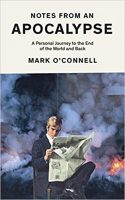Notes from an Apocalypse: A Personal Journey to the End of the World and Back
By Mark O’Connell
(Granta, £14.99)
 This review will be overtaken by events. It’s bound to be. While I was reading the book, its writer posted a picture on Twitter of the contents of a box he had just opened at home. “Who could have predicted,” he asked, “that these copies of the US edition of my book about apocalyptic anxiety would be delivered by a guy in a face mask, and that I would open the box using plastic gloves? Not me!”
This review will be overtaken by events. It’s bound to be. While I was reading the book, its writer posted a picture on Twitter of the contents of a box he had just opened at home. “Who could have predicted,” he asked, “that these copies of the US edition of my book about apocalyptic anxiety would be delivered by a guy in a face mask, and that I would open the box using plastic gloves? Not me!”
He’s being a little hard on himself. He was well ahead of most of us, already up and on the road long before the Four Horsemen appeared on their mounts in the Chinese city of Wuhan. See that title: Notes from an Apocalypse.
O’Connell is a journalist and essayist. He won the 2018 Wellcome Book Prize for To Be a Machine, an exploration of transhumanism, a movement that suggests we can and should exploit technology to “improve” the human body and, ultimately, make ourselves immortal. He is also the father of two young children, and constantly worrying over what sort of world he’s brought them into. It’s a world where lies as well as germs go viral, where we humans are making the weather, where old alliances and certainties are being overturned, and where the monied are readying to leave the rest of us behind, having bought bunkers in the middle of nowhere, boltholes on the other side of the world, or tickets to a life on Mars.
The signs of apocalypse, he reckons, are all around, and while he’s anxious, he’s also intrigued. So off he goes on a series of “perverse pilgrimages” to the places where the end-times seem closest — from South Dakota, with its underground shelters offering “turnkey apocalypse solutions”, to the Chernobyl Exclusion Zone, where the abandoned city of Pripyat is “a fever-dream of a world gone void”. In between, he examines the tech billionaires’ fixation with New Zealand, mixes with the Mars Society in Los Angeles, and joins an environmentalists’ retreat in the Scottish Highlands. He has sessions with his therapist, and draws on the work of writers as various as Carl Sagan and Dr Seuss. The result is a book that’s fretful, wise and funny, and often all three in the space of a paragraph.
O’Connell thoroughly skewers America’s boasting “preppers”, with a story about one who began eating into his freeze-dried rations — because his wife was away, he couldn’t cook and it didn’t occur to him to phone for pizza. Then he tells of a friend of his who works in publishing, who reveals that she has a “go-bag”, ready to be hauled out from under the bed at a moment’s notice.
His friend sees something exciting in the prospect of testing herself and her limits. O’Connell doesn’t: his comfort zone, he says, is one with four walls, good Wi-Fi, and craft beer and a bookshop within walking distance. On his “solo” in the Alladale Wilderness Reserve, he breaks the spirit of the rules by taking half a packet of nut-and-berry mix with him. His account of eking it out reminded me of the narrator of John Lanchester’s novel The Wall, who, while patrolling Britain’s borders against climate refugees, breaks up the time between breakfast and lunch into two sections of 90 minutes, with an energy bar in the middle.
O’Connell’s own book is a work of non-fiction peopled by some characters a novelist wouldn’t get away with. I thought perhaps he’d overplayed the zealotry of those who see Mars as the new frontier and the new destiny for earthlings. But no: while I was reading his chapter on Chernobyl, I got an email from a PR firm with this heading: “To infinity and beyond: conquering the final frontier with Asgardia.” It went on: “Whilst plans for holidays and trips away have been put on the back-burner, the desire for outer-orbit travel hasn’t diminished…”
Notes from an Apocalypse is a book in which even the typos seem somehow to be in keeping with the theme (“A state stripped down to its bear [sic] right-wing essentials”). It’s also one that makes reference to center and specter and neighbors and fibers. Have we in the UK, in another seemly accident, been given the American text?
O’Connell sometimes reaches for the fancy (strewn disjecta) over the plain or strays into redundancy (“The fact of the matter was that…”). Occasionally, too, he over-explains. In the Highlands, a woman offers to help him put up his tent; she worked in a camping store, she says, and she knows that “They’re tricky bastards, some of them.” O’Connell is “struck by the empathic skillfulness [sic] of this revelation” — and then, in a sentence 132 words long, tells us why.
If he reads that, it might bother him, maybe add to his fretting. But it shouldn’t: he’s doing good work in difficult times. He offers us hope as well as black humour. And we need that now. MK
*This review went up on the website of the Telegraph on April 20, 2020, where I found it yesterday (Saturday, April 25). Did it also appear in print? At the moment (Sunday, April 26), I don’t know, because I’m trying to avoid shops and haven’t been able to buy a paper lately.
